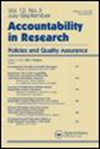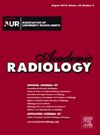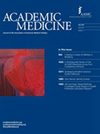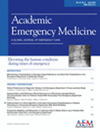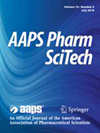Frontiers in Molecular Neuroscience
SCIE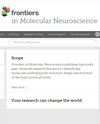
- 雜志名稱:分子神經(jīng)科學(xué)前沿
- 簡稱:FRONT MOL NEUROSCI
- 期刊ISSN:1662-5099
- 大類研究方向:醫(yī)學(xué)
- 影響因子:3.72
- 數(shù)據(jù)庫類型:SCIE
- 是否OA:Yes
- 出版地:SWITZERLAND
- 年文章數(shù):418
- 小類研究方向:醫(yī)學(xué)-神經(jīng)科學(xué)
官方網(wǎng)站:http://journal.frontiersin.org/journal/molecular-neuroscience
投稿網(wǎng)址:http://www.frontiersin.org/submission/submissioninfo.aspx
Frontiers in Molecular Neuroscience
英文簡介Frontiers in Molecular Neuroscience publishes rigorously peer-reviewed research that aims to identify key molecules underlying the structure, design and function of the brain across all levels. Specialty Chief Editors Robert J. Harvey at the University of the Sunshine Coast, Queensland, Australia, and Jochen C. Meier at the Technische Universitat Braunschweig, Germany, are supported by an outstanding Editorial Board of international experts. This multidisciplinary open-access journal is at the forefront of disseminating and communicating scientific knowledge and impactful discoveries to researchers, academics and the public worldwide.Frontiers in Molecular Neuroscience welcomes submissions of the following article types: Book Review, Brief Research Report, Correction, Data Report, Editorial, General Commentary, Hypothesis and Theory, Methods, Mini Review, Opinion, Original Research, Perspective, Review, Specialty Grand Challenge, Systematic Review and Technology and Code.All manuscripts must be submitted directly to Frontiers in Molecular Neuroscience, where they are peer-reviewed by the Associate and Review Editors of the specialty journal.Articles published in Frontiers in Molecular Neuroscience will benefit from the Frontiers impact and tiering system after online publication. Authors of published original research with the highest impact, as judged democratically by the readers, will be invited by the Chief Editor to write a Frontiers Focused Review - a tier-climbing article. This is referred to as "democratic tiering". The author selection is based on article impact analytics of original research published in the Frontiers specialty journals and sections. Focused Reviews are centered on the original discovery, place it into a broader context, and aim to address the wider community of the field.
Frontiers in Molecular Neuroscience
中文簡介分子神經(jīng)科學(xué)的前沿發(fā)表了嚴(yán)格的同行評審的研究,旨在確定大腦結(jié)構(gòu)、設(shè)計(jì)和功能的關(guān)鍵分子。澳大利亞昆士蘭陽光海岸大學(xué)的專業(yè)主編羅伯特J.哈維和德國布倫瑞克理工大學(xué)的喬森C.邁爾得到了一個(gè)杰出的國際專家編輯委員會的支持。這本多學(xué)科開放獲取期刊處于向研究人員、學(xué)者和全世界公眾傳播和交流科學(xué)知識和有影響力的發(fā)現(xiàn)的前沿。分子神經(jīng)科學(xué)的前沿領(lǐng)域歡迎以下文章類型的提交:書評、簡要研究報(bào)告、更正、數(shù)據(jù)報(bào)告、編輯、一般評論、假設(shè)和理論、方法、小評論、觀點(diǎn)、原始研究、觀點(diǎn)、評論、專業(yè)大挑戰(zhàn)、系統(tǒng)評論和技術(shù)和代碼。所有的手稿必須直接提交給分子神經(jīng)科學(xué)的前沿領(lǐng)域,在那里,他們是同行評審的助理和審查編輯的專業(yè)期刊。在分子神經(jīng)科學(xué)前沿發(fā)表的文章將從網(wǎng)絡(luò)出版后的前沿影響和分層系統(tǒng)中獲益。根據(jù)讀者的民主判斷,發(fā)表了影響最大的原創(chuàng)研究的作者將被主編邀請撰寫一篇前沿的重點(diǎn)評論——一篇爬坡文章。這被稱為“民主分層”。作者選擇是基于文章影響分析的原始研究發(fā)表在前沿專業(yè)期刊和章節(jié)。重點(diǎn)審查集中在原始發(fā)現(xiàn)上,將其置于更廣泛的背景中,并旨在解決該領(lǐng)域更廣泛的社區(qū)問題。
Frontiers in Molecular Neuroscience
中科院分區(qū)| 大類學(xué)科 | 分區(qū) | 小類學(xué)科 | 分區(qū) | Top期刊 | 綜述期刊 |
| 醫(yī)學(xué) | 2區(qū) | NEUROSCIENCES 神經(jīng)科學(xué) | 3區(qū) | 否 | 否 |
Frontiers in Molecular Neuroscience
JCR分區(qū)| JCR分區(qū)等級 | JCR所屬學(xué)科 | 分區(qū) | 影響因子 |
| Q1 | NEUROSCIENCES | Q1 | 6.261 |
Frontiers in Molecular Neuroscience
中科院JCR分區(qū)歷年趨勢圖Frontiers in Molecular Neuroscience
影響因子精選同類領(lǐng)域期刊,熱門推薦輕松get~
-
- Accountability in Research-Policies and Quality Assurance
- 期刊ISSN:0898-9621
- 大類研究方向:醫(yī)學(xué)
- 影響因子:3.057
- 數(shù)據(jù)庫類型:SCIE
- 咨詢投稿
-
- ACADEMIC RADIOLOGY
- 期刊ISSN:1076-6332
- 大類研究方向:醫(yī)學(xué)
- 影響因子:/s/sciqk/12416.jpg
- 數(shù)據(jù)庫類型:SCIE
- 咨詢投稿
-
- Academic Pediatrics
- 期刊ISSN:1876-2859
- 大類研究方向:醫(yī)學(xué)
- 影響因子:2.993
- 數(shù)據(jù)庫類型:SCIE
- 咨詢投稿
-
- ACADEMIC MEDICINE
- 期刊ISSN:1040-2446
- 大類研究方向:醫(yī)學(xué)
- 影響因子:7.840
- 數(shù)據(jù)庫類型:SCI/SCIE
- 咨詢投稿
-
- ACADEMIC EMERGENCY MEDICINE
- 期刊ISSN:1069-6563
- 大類研究方向:醫(yī)學(xué)
- 影響因子:
- 數(shù)據(jù)庫類型:SCI/SCIE
- 咨詢投稿
-
- AAPS PHARMSCITECH
- 期刊ISSN:1530-9932
- 大類研究方向:醫(yī)學(xué)
- 影響因子:
- 數(shù)據(jù)庫類型:SCIE
- 咨詢投稿
精選常見問題,答疑解惑輕松get~
- 三篇ssci論文怎么同時(shí)投出去
- 中文核心和sci哪個(gè)影響力更大
- 中科院一區(qū)和JCR一區(qū)期刊占比區(qū)別
- 發(fā)ssci如何快速找合適的期刊
- 資源保護(hù)方面論文投sci指導(dǎo)
- 外貿(mào)行業(yè)論文發(fā)ssci周期長嗎
- 國外的sci投到錄用一般多久
- ssci期刊國內(nèi)認(rèn)可度
- 核能應(yīng)用論文翻譯英文發(fā)sci容易的方法
- 人口老齡化研究論文符合ssci領(lǐng)域嗎
- sci開源和不開源分別是什么意思?有什么影響?
- ssci發(fā)表是高水平學(xué)術(shù)論文嗎
- 生態(tài)修復(fù)主題英文論文會收錄哪些數(shù)據(jù)庫
- 哲學(xué)專業(yè)論文發(fā)英文期刊
- 中科院sci四個(gè)區(qū)的劃分
- ssci期刊和sci期刊的區(qū)別
- ESCI和SCIE要分清
- ssci送審論文多久出結(jié)果
- ssci論文二作有用嗎
- 水土保持類英文期刊好選嗎
- ssci期刊論文一定會檢索嗎
 投稿咨詢
投稿咨詢

